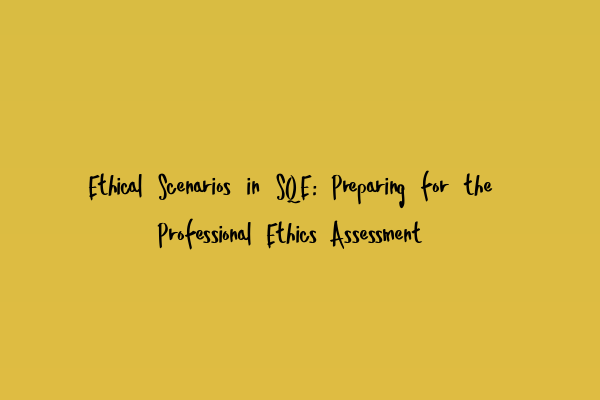Ethical Scenarios in SQE: Preparing for the Professional Ethics Assessment
Are you getting ready to take the Solicitors Qualifying Examination (SQE) and feeling a bit overwhelmed by the thought of the Professional Ethics Assessment? You’re not alone. The inclusion of ethics in the assessment is an essential component of legal training, as it ensures that future solicitors are equipped with the knowledge and skills to handle ethical dilemmas they may encounter in their professional careers. In this blog post, we will explore some ethical scenarios you may come across during the exam and offer guidance on how to approach them.
Before we dive into the scenarios, let’s first understand the importance of ethics in the legal profession. Ethics serve as the cornerstone of the legal system. They govern the conduct of solicitors and help maintain public trust in the fairness and integrity of the legal profession. As a solicitor, it is crucial to have a solid understanding of ethical principles and be able to apply them in real-life situations.
Now let’s move on to the scenarios. Keep in mind that these are just examples and the actual exam may present different situations. Nonetheless, familiarizing yourself with various scenarios will help you develop a well-rounded approach to tackling ethical challenges.
Scenario 1: Conflicts of Interest
Imagine you are representing two clients who have conflicting interests in a business deal. Both clients are seeking your advice on how to proceed. How would you handle this situation? It’s essential to identify the conflict and act in the best interests of each client while maintaining your duty of loyalty to both. One possible approach could be to obtain informed consent from both clients after explaining the potential risks and consequences associated with the conflict.
Keywords: conflicts of interest, representing clients, duty of loyalty, informed consent
Scenario 2: Client Confidentiality
You receive a call from a journalist who is seeking information about a client’s ongoing case. How would you respond to this request while upholding client confidentiality? As a solicitor, it is crucial to safeguard client information and maintain confidentiality. In this scenario, you could politely decline the journalist’s request, explaining that you are bound by professional rules to maintain client confidentiality.
Keywords: client confidentiality, journalist request, professional rules, safeguarding information
Scenario 3: Professional Competence
You come across a legal issue that is outside your area of expertise. Should you proceed and attempt to handle the matter, or should you refer the client to a more competent solicitor? When faced with a situation that falls outside your scope of expertise, the ethical choice is to refer the client to an expert who is better equipped to handle the matter. This ensures that the client receives the best possible representation and upholds the duty of competence.
Keywords: professional competence, legal issue, referral, duty of competence
As you prepare for the Professional Ethics Assessment, it is crucial to study ethical principles, rules, and guidelines outlined by professional bodies such as the Solicitors Regulation Authority (SRA). Being familiar with these standards will help you navigate through ethical scenarios effectively.
To enhance your preparation, consider discussing ethical dilemmas with fellow aspiring solicitors or engaging in mock interviews where you can practice your analysis and decision-making skills. Additionally, keep up to date with recent legal cases and developments as they often present ethical challenges that may be examined in the assessment.
In conclusion, the SQE’s inclusion of ethical scenarios in the Professional Ethics Assessment serves to evaluate your understanding and application of ethical principles as a future solicitor. By familiarizing yourself with various scenarios and practicing ethical decision-making, you can confidently approach the assessment and demonstrate your commitment to upholding ethical standards in the legal profession.
Remember, ethics are not just crucial for passing the assessment but also for shaping your professional identity as a solicitor who acts with integrity, responsibility, and fairness. Good luck with your preparation!

Leave a Reply